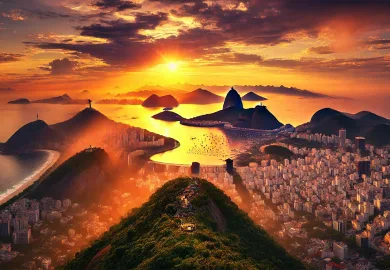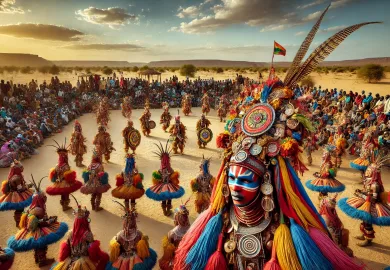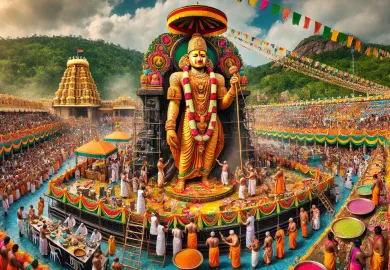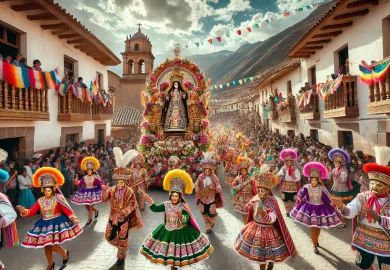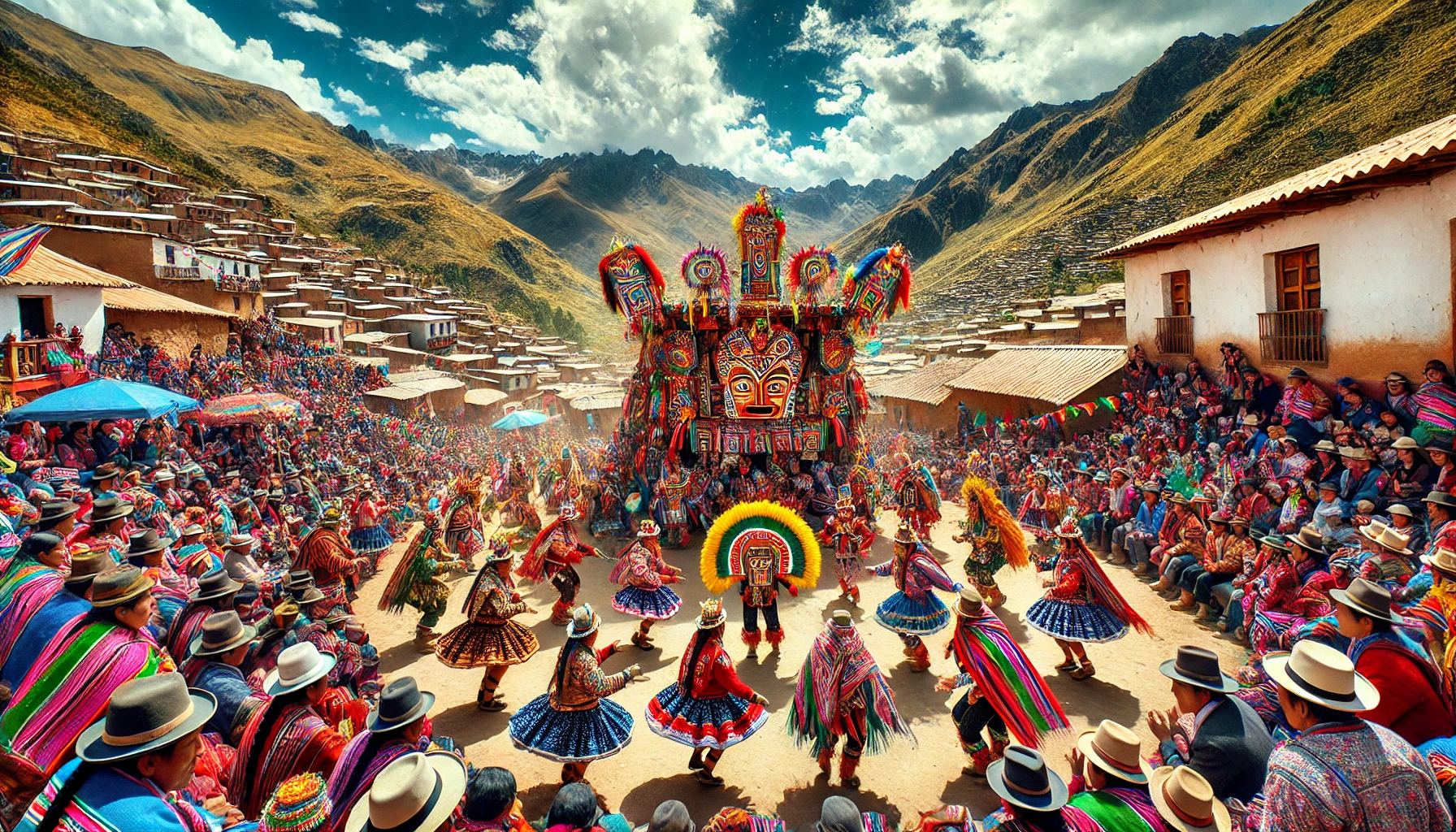
Disclaimer: This content was generated using AI. While I strive for accuracy, I encourage readers to verify important information. I use AI-generated content to increase efficiencies and to provide certain insights, but it may not reflect human expertise or opinions.
Bolivia is home to a wealth of cultural traditions, many of which have been preserved and celebrated for centuries. Among these, the Tinku stands out as one of the most intriguing and misunderstood festivals. Rooted in the indigenous communities of the Andes, particularly in the Potosí region, Tinku is both a religious and cultural event that combines ritual combat, music, dance, and a deep sense of communal identity. This ancient practice is much more than just a spectacle; it is a powerful expression of cultural resilience, identity, and tradition.
Origins of the Tinku: A Fusion of Myth and Reality
The Tinku, which translates to “encounter” in the Quechua language, has its roots deeply embedded in the history and mythology of the Andean people. It is believed to be a pre-Columbian tradition, dating back hundreds of years, and has been passed down through generations. The festival occurs annually, primarily in May, coinciding with the Catholic celebrations of the Virgin of the Cross, which highlights the syncretism between indigenous and Catholic beliefs.
The origins of Tinku are shrouded in both myth and reality. According to local legends, Tinku was initially a way to settle disputes between rival communities, often revolving around issues such as land, water rights, and resources. These disputes were resolved through ritual combat, where representatives from each community would engage in a controlled fight, symbolizing a balance between opposing forces. The blood spilled during these fights was believed to be an offering to Pachamama, the Earth Mother, to ensure fertility and a good harvest.
Over time, the Tinku evolved into a more formalized event, incorporating elements of celebration, music, and dance. However, the central theme of combat remains, as it is seen as a way to release pent-up tensions and maintain social harmony within the community.
The Ritual Combat: A Symbol of Strength and Unity
At the heart of the Tinku festival is the ritual combat, a practice that can be both awe-inspiring and intense for those unfamiliar with its cultural significance. Participants, usually men from different communities, gather in a public space, often the town square, to engage in one-on-one or group fights. These battles are not just physical confrontations; they are symbolic acts that carry deep cultural meaning.
The combatants wear traditional clothing, which includes brightly colored ponchos, helmets, and belts adorned with feathers and other decorations. These outfits not only provide some protection but also symbolize the wearer’s strength and bravery. The fights are typically fought with fists, but sticks and whips are sometimes used. Although the combat can be fierce, there are unspoken rules that participants generally adhere to, ensuring that the violence does not escalate to dangerous levels.
The blood spilled during the Tinku is considered a sacred offering to Pachamama. It is believed that the Earth Mother needs this blood to remain fertile and to provide for the people. This belief is deeply ingrained in the Andean worldview, where the connection between humans and nature is seen as a reciprocal relationship. In this context, the ritual combat is not an act of gratuitous violence but a necessary and respected tradition that reinforces communal bonds and honors the Earth.
Music and Dance: The Rhythmic Heartbeat of Tinku
While the ritual combat is the most striking aspect of Tinku, the festival is also a vibrant celebration of music and dance. These elements play a crucial role in the event, serving to both energize the participants and create a festive atmosphere for the entire community.
Traditional Andean music, characterized by the use of instruments such as the charango (a small stringed instrument), panpipes, and drums, fills the air throughout the festival. The music is rhythmic and powerful, reflecting the energy and intensity of the Tinku itself. Songs often tell stories of the ancestors, the land, and the gods, reinforcing the cultural heritage of the participants.
Dancing is another key component of Tinku. Groups of dancers, often organized by community or family, perform intricate routines that have been passed down through generations. The dances are not just performances but are deeply symbolic, representing various aspects of Andean cosmology, such as the cycle of life, the seasons, and the relationship between humans and the natural world.
The combination of music and dance creates a dynamic environment that engages all the senses. It is not just the combatants who participate in the Tinku; the entire community, including women, children, and elders, joins in the celebrations, making it a truly communal event.
The Cultural Significance of Tinku in Modern Bolivia
In contemporary Bolivia, Tinku holds a special place as both a cultural tradition and a symbol of indigenous identity. Despite the influence of modernization and the pressures of globalization, Tinku has remained a vital part of the cultural landscape, particularly in rural areas where indigenous traditions are still strong.
For many Bolivians, Tinku is a way to connect with their ancestral roots and reaffirm their cultural identity. It is a powerful expression of resilience in the face of historical oppression and marginalization. The festival also serves as a reminder of the importance of community, tradition, and the reciprocal relationship between humans and nature.
However, Tinku is not without its controversies. The ritual combat aspect of the festival has raised concerns among outsiders, particularly regarding the potential for violence and injury. Some have called for the practice to be banned or heavily regulated. However, for those who participate in and support the Tinku, these concerns are often seen as misunderstandings of the festival’s cultural significance. They argue that the Tinku should be respected and preserved as an integral part of Bolivia’s cultural heritage.
In recent years, there has been a growing movement to promote and protect the Tinku, both within Bolivia and internationally. Cultural organizations, anthropologists, and indigenous activists have worked to raise awareness about the importance of the festival and to ensure that it is not misunderstood or misrepresented. Efforts have also been made to incorporate Tinku into Bolivia’s tourism industry, offering visitors a chance to witness this unique tradition while respecting its cultural context.
Conclusion
The Tinku festival in Bolivia is a vibrant and complex tradition that offers a unique window into the cultural and spiritual life of the Andean people. Far from being a mere spectacle of ritual combat, Tinku is a profound expression of cultural identity, communal solidarity, and the deep connections between humans and the natural world. As Bolivia continues to navigate the challenges of modernization and globalization, the preservation and celebration of traditions like Tinku are more important than ever. By understanding and respecting these traditions, both Bolivians and visitors alike can gain a deeper appreciation of the rich cultural heritage that defines this remarkable country.

